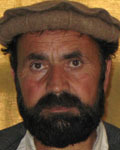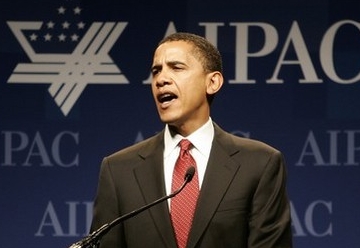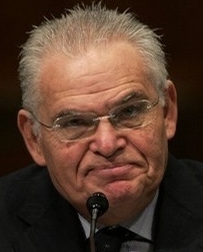… in the years ahead our country must still come to grips with our national acquiescence to the politics of fear, which has led to the detention and abuse of hundreds of individuals. Among the necessary steps will be restoration of freedom to innocent detainees, accompanied by public apology and some monetary restitution for the years they lost to incarceration. Furthermore, Congress needs to accept responsibility for its complicity with the executive in laws that denied suspects rightful appeal. A national truth commission should be instituted to establish political accountability for the decisions, policies and statutes that placed suspects outside the protection of the law.
Congress might create a bipartisan commission in the style of the Iraq Study Group (members of both parties have criticized the detention system), or, failing Congressional action, a broad association of foundations and human rights groups could organize such an effort. A truth commission should not engage in a witch hunt, but make a serious effort to understand the subversion of the rule of law in the post-9/11 panic and to build a barrier of public opinion and professional responsibility to prevent similar failure in the future. If the nation does not make a collective effort to come to grips with the subversion of liberty in the name of security, we will leave ourselves and generations to come vulnerable to still greater violations and silent coups d’état.
Editor’s Comment — As the pendulum has swung from national support to disenchantment with the war presidency, it’s been all too easy for ordinary Americans to absolve themselves of responsibility for the mess this country is in and the damage it has inflicted on the world. Even to speak of the politics of fear is in some degree evasive.
What far too few have ever been bold enough to say is that America’s response to 9/11 was cowardly. A willingness to indulge in a form of national hysteria was the enabling factor that turned a catastrophic event into the foundation for war. Even now, the promise of a presidency of change is that we can shift our attention away from a war that is a “dangerous distraction” to the one that tackles the “real threat.” If we are at a defining moment, it is apparently not one that opens the political opportunity to challenge the assumptions that war is an effective instrument of counterterrorism or that national security should be uppermost among our concerns.
With the appearance of this very fine book, Hillary Clinton can claim a belated vindication of sorts: A right-wing conspiracy does indeed exist, although she misapprehended its scope and nature. The conspiracy is not vast and does not consist of Clinton-haters. It is small, secretive and made up chiefly of lawyers contemptuous of the Constitution and the rule of law.
In The Dark Side, Jane Mayer, a staff writer for the New Yorker, documents some of the ugliest allegations of wrongdoing charged against the Bush administration. Her achievement lies less in bringing new revelations to light than in weaving into a comprehensive narrative a story revealed elsewhere in bits and pieces. Recast as a series of indictments, the story Mayer tells goes like this: Since embarking upon its global war on terror, the United States has blatantly disregarded the Geneva Conventions. It has imprisoned suspects, including U.S. citizens, without charge, holding them indefinitely and denying them due process. It has created an American gulag in which thousands of detainees, including many innocent of any wrongdoing, have been subjected to ritual abuse and humiliation. It has delivered suspected terrorists into the hands of foreign torturers.
Under the guise of “enhanced interrogation techniques,” it has succeeded, in Mayer’s words, in “making torture the official law of the land in all but name.” Further, it has done all these things as a direct result of policy decisions made at the highest levels of government.
How the war on terror turned into a war on American ideals,’ by Jane Mayer
“The greatest dangers to liberty lurk in the insidious encroachment by men of zeal, well-meaning but without understanding.”
Justice Louis Brandeis wrote those lines 80 years ago, but as Jane Mayer’s brilliantly reported and deeply disturbing new book, “The Dark Side: The Inside Story of How the War on Terror Turned Into a War on American Ideals,” more than amply illustrates, they’ve never been more relevant.
In fact, if you intend to vote in November and read only one book between now and then, this should be it. By and large, Mayer does not add any strikingly new information to what attentive readers already will know about Bush/Cheney’s adoption of torture as an instrument of American state power and of how the Central Intelligence Agency, its international accomplices and the U.S. military constructed what amounts to an American gulag to further that end. Mayer’s singular accomplishment is to fuse the years of events that have brought us to this pass into a single compelling narrative and to use her own considerable reportorial powers to fill in important connective and contextual events.
Democratic presidential candidate Senator Barack Obama is the man with the plan for Iraq and Afghanistan. Presidential in tone and delivery, quoting Harry S Truman and Dean Acheson, George Kennan and George Marshall – the greatest generation – Obama, in a major foreign policy speech in Washington on Tuesday, outlined what he calls his “new overarching strategy”.
He said he would “focus this strategy on five goals essential to making America safer: ending the war in Iraq responsibly; finishing the fight against al-Qaeda and the Taliban; securing all nuclear weapons and materials from terrorists and rogue states; achieving true energy security; and rebuilding our alliances to meet the challenges of the 21st century”.
To say that Obama’s plan – sketched earlier in an op-ed piece for The New York Times – is more realistic, thoughtful and sensible than that of rival Republican Senator John McCain’s “road to victory” in Iraq would be an understatement.
Palestinians reluctantly put faith in Obama
Ask many Palestinians or Israelis and they will tell you that US presidential elections are so important for their futures they should be allowed to vote.
Like Israelis, Palestinians see Washington as the most influential third-party player in their conflict. Unlike Israelis, Palestinians see that influence as mostly malign.
Both will carefully watch John McCain and Barack Obama as they try to become the leader of the world’s only superpower. And where polls show Israelis split over which senator they would support, Palestinians overwhelmingly favour Mr Obama.
Yet that support is qualified by cynicism. Palestinians have no illusions when it comes to the US position on the Palestinian-Israeli conflict. “America,” a local restaurateur recently told me, “is irredeemably pro-Israel. I only support Obama because I think he will be good for America and good for black people. For us it will make no difference.”
US troops poised to cross Afghan border for raid on bases
US troops in Afghanistan massed close to the border yesterday for a possible attack on al-Qaeda and Taleban bases in the lawless North Waziristan tribal belt in Pakistan.
Reports from the area said that hundreds of Nato troops were airlifted across the mountains from the village of Lowara Mandi, which has been an important base for cross-border attacks in Afghanistan. Heavy artillery and armoured vehicles were also being moved into position.
The deployment followed a claim by the Afghan Government on Monday that the Pakistani Army and its spy agency had become “the world’s biggest producers of terrorism and extremism”. The Pakistani Foreign Ministry accused Kabul of creating an “artificial crisis to satisfy short-term political expediencies”.
Militants ready for a war without borders
From thinly disguised insinuations against Pakistan following the suicide attack on the Indian Embassy in Kabul this month to outright accusations against Islamabad by the Afghan government over the unrelenting Taliban-led insurgency, the blame game has entered a critical time: a major regional battle could erupt in a matter of days.
Last week, US Joint Chiefs of Staff chairman Admiral Mike Mullen paid a sudden visit to Pakistan during which he revealed to Pakistani leaders and military officials the possibility of surgical strikes on Taliban and al-Qaeda networks operating in the border regions and that coalition forces in Afghanistan would not hesitate to conduct hot-pursuit raids into Pakistan.
Mullen urged Pakistani leaders to play their part from their side. He pin-pointed the North and South Waziristan tribal areas as a focal point, along with the areas of Razmak, Shawal, Ghulam Khan and Angor Ada along the border with Afghanistan. Across the divide, Khost province is considered a likely target for carpet bombing and an offensive by the Afghan National Army.
Perhaps because his American “strategic adviser” has told him that this is the way to win the approaching primaries in his Kadima Party, Israel’s former minister of defense, Shaul Mofaz, says that Israel must eliminate the “existential threat” that Iran’s nuclear program represents. Probably because he is afraid, Iran’s president, Mahmoud Ahmadinejad, says that if Israel (or the U.S) attacks his country, the latter will hit back with all its might.
Israel holds maneuvers over the Mediterranean, testing its forces and probably sending a message to Tehran: Back off. Iran also holds maneuvers, testing its forces and sending a very clear message to Washington and Tel Aviv: Back off. “Senior sources” in the Pentagon say that, in view of the progress the Iranians are making, Israel must attack by the end of the year and that it got the yellow light from the U.S administration. “Senior sources” in the State Department say that their opposite numbers in the Pentagon are talking rubbish.
Nobody knows whether Israel and/or the U.S will attack Iran — after all, there are no limits to how crazy some people can be. That neither the U.S nor Israel shouldattack Iran is, to this writer at any rate, very clear indeed. Here is why.
American envoy to join Iran talks
The Bush administration will send a senior envoy this weekend to international talks with Iran about its nuclear program in what U.S. officials described as a “one-time deal” designed to demonstrate a serious desire to negotiate a solution to the impasse over Tehran’s ambitions.
In a significant departure from long-standing policy, Undersecretary of State William J. Burns will join a scheduled meeting in Geneva between European Union foreign policy chief Javier Solana and top Iranian nuclear negotiator Saeed Jalili, according to a senior State Department official.
Burns, State’s third-ranking official, will not negotiate with the Iranians nor hold separate meetings, the official said, speaking on the condition of anonymity because the decision had not yet been announced. Instead, Burns will advance the White House’s position that serious negotiations can begin only after Iran suspends uranium enrichment.
When will it end, this crushing rise in the price of gasoline, now averaging $4.10 a gallon at the pump? The question is uppermost in the minds of American motorists as they plan vacations or simply review their daily journeys. The short answer is simple as well: “Not soon.”
As yet there is no sign of a reversal in oil’s upward price thrust, which has more than doubled in a year, cresting recently above $146 a barrel. The current oil shock, the fourth of its kind in the past three-and-a-half decades, and the deadliest so far, shows every sign of continuing for a long, long stretch.
The previous oil shocks — in 1973-74, 1980, and 1990-91 — stemmed from specific interruptions of energy supplies from the Middle East due, respectively, to an Arab-Israeli war, the Iranian revolution, and Iraq’s invasion of Kuwait. Once peace was restored, a post-revolutionary order established, or the invader expelled, vital Middle Eastern energy supplies returned to normal. The fourth oil shock, however, belongs in a different category altogether.
Obama says New Yorker insulted Muslim Americans
Democrat Barack Obama said Tuesday that the New Yorker magazine’s satirical cover depicting him and his wife as flag-burning, fist-bumping radicals doesn’t bother him but that it was an insult to Muslim Americans.
“You know, there are wonderful Muslim Americans all across the country who are doing wonderful things,” the presidential candidate told CNN’s Larry King. “And for this to be used as sort of an insult, or to raise suspicions about me, I think is unfortunate. And it’s not what America’s all about.”

 he militants crept up behind Mohammed Akhtiar as he squatted at the spigot to wash his hands before evening prayers at the Guantanamo Bay detention camp.
he militants crept up behind Mohammed Akhtiar as he squatted at the spigot to wash his hands before evening prayers at the Guantanamo Bay detention camp. The Wikipedia entry for New York Times reporter,
The Wikipedia entry for New York Times reporter,  rab leaders have reacted with anger and disbelief to an intensely pro-Israeli speech delivered by Barack Obama, the US Democratic presumptive presidential nominee.
rab leaders have reacted with anger and disbelief to an intensely pro-Israeli speech delivered by Barack Obama, the US Democratic presumptive presidential nominee. I interviewed five Islamic scholars, at five American universities, recommended by a variety of sources as experts in the field. All of them said that Luttwak’s interpretation of Islamic law was wrong.
I interviewed five Islamic scholars, at five American universities, recommended by a variety of sources as experts in the field. All of them said that Luttwak’s interpretation of Islamic law was wrong.